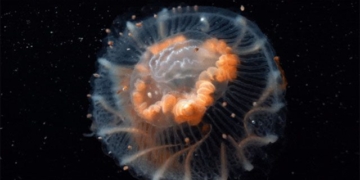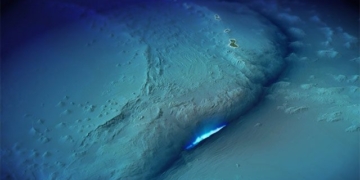According to CNN, when clicking on the website of any luxury resort in the Maldives, users will see an entire page dedicated to sustainability commitments and related “green” certifications.
Notably, the slogan is not typical tourism marketing; it emphasizes waste management, soil erosion, and solar energy production. For a long time, the Maldives has been more than just a typical destination. As the lowest-lying country in the world, 99% of its land is water, with over 1,000 islands spread across 90,000 square kilometers. Most of the country’s resorts are located on individual islands, enhancing their responsibility to minimize the impact on the fragile environment of the Maldives.

(Image source: CNN)
Do tourists really care about the sustainability of the resorts?
Marine biologist Samuel Dixon, who has worked at the Fairmont Maldives Sirru Fen Fushi Resort, confirms that they do. As the sustainability manager of the luxury resort, he oversees all the eco-inspired initiatives of the 120-villa property, from protecting a 9-kilometer long coral reef to implementing advanced energy-saving strategies.
“We are seeing a strong increase in the number of environmentally conscious tourists, especially in the luxury hotel market. I notice many questions about some of the work I am doing, whether it’s coral restoration, turtle conservation, recycling, or energy use, as well as how to use solar energy. Travelers understand that this is the trend for sustainable hotel development in the future,” he said.
Sustainable Laboratory
Mr. Dixon also oversees the installation of a new facility at the resort called “Sustainable Laboratory”, which provides information to tourists to address one of the biggest challenges the Maldives faces: plastic waste.
Opened in early 2022, this is the first center focused on marine waste management in the country. Located just a few steps from the resort’s dock, inside a building made from recycled shipping containers, the facility is equipped with specialized machines that transform plastic waste into souvenirs, furniture, and supplies for local schools. The lab also recycles discarded “ghost nets” from fishing by weaving them into bracelets and luggage tags.
A visit to the lab reveals large bins filled with small pieces of plastic in various colors, lined up on shelves, ready to be processed by industrial machines and melted down into various shapes and sizes. The predominant color is blue, thanks to the abundance of plastic water bottle caps.
Mr. Dixon also noted that the plastic comes from many sources. There are packaging materials that accompany weekly food supplies. Trucks collect plastic waste from nearby hotels and local schools. And of course, the ocean provides an endless supply of fuel.
“Unfortunately, the source of waste remains consistent in the ocean every day. We have to remove about 3 to 5 kilograms of waste each morning right from this resort, of which about 1 to 2 kilograms is plastic. So we will continue collecting and making trips to uninhabited islands elsewhere,” Mr. Dixon added.
Marine Waste Processing
The processing of waste also follows several steps. First, the plastic is washed to remove dirt or residue. Next, it is chopped into small pieces and fed into an extruder that melts the plastic and shapes it into 3D molds to create souvenir turtles, carabiner hooks, and school rulers.
Additionally, there is a press that flattens the plastic into sheets that can be used “just like wood.” The resort’s carpentry team uses these sheets to create furniture that guests can order and have shipped home.
While the amount of plastic processed may seem small in the grand scheme, Mr. Dixon emphasizes the importance of raising awareness among tourists about the issues the Maldives faces while also working with the local community to address these challenges.
“I think it’s wonderful to bring this work into the hospitality industry, especially in a destination like the Maldives—considered a pristine paradise that many tourists want to visit,” he said.
No plastic water bottles—only glass bottles—are provided, and each guest receives a reusable water bottle at one of the island’s water stations to take home as a souvenir. Even the toothpaste in the dental kits is packaged in small paper wrappers.
Underwater Art Installation with Artificial Coral
Another resort focusing on conservation is the unique underwater art installation exhibit Coralarium, located just a few dozen meters offshore from the main beach area. The large metal sculpture is known as a coral garden for local wildlife that visitors can snorkel and explore.
“Coralarium aims to become an educational and conservation center. Everything is made from materials with a neutral pH, so they are non-toxic to marine life and do not contain harmful pollutants. The structure is designed to replicate a hard substrate of coral reefs. When corals experience mass spawning events, Coralarium essentially captures coral polyps and fosters natural coral growth. About 120 species of fish have moved in, thus creating a small habitat for marine life,” he explained.
Secret Water Island
The Fairmont Maldives Resort is located in an area nicknamed “Secret Water Island.” At the back of the island is the resort’s 9-kilometer-long house reef, home to over 400 species of marine life. Directly offshore, the destination can be easily explored with a snorkeling set. Visitors from December to April can witness the manta ray season of the reef.
Regarding accommodations, Fairmont Maldives Sirru Fen Fushi offers a variety of overwater villas of different sizes, while beach lovers can choose sunrise or sunset villas. There are also tent-style villas for those wanting to get closer to nature. Children can learn more about the resort’s conservation efforts by participating in the New Generation Sea program, which includes visits to both the Sustainable Laboratory and the Coral Reef.
For sustainability development managers like Mr. Dixon, witnessing tourists of all ages showing interest in these once-overlooked issues is truly amazing.
“When I think about how we have really adapted and created a more sustainable environment here, especially with sustainable practices in this resort, it makes me very proud,” Mr. Dixon said.


















































